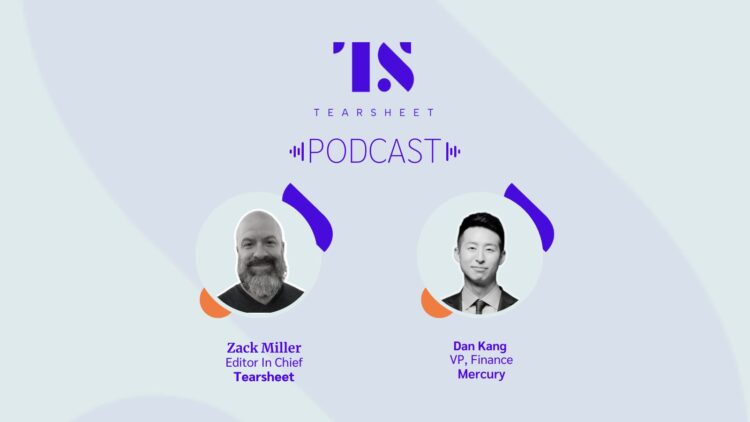
Today’s episode of the Tearsheet podcast features Dan Kang, VP of Finance at Mercury. He shares his insights on how the fintech company is reshaping corporate finance for tech founders. Kang has experience in private equity, Square, and Mercury. This background gives him a unique view of financial services for startups and positions the neobank nicely as the IPO window opens wider for more of its clients.
His insights are especially valuable in today’s changing financial landscape. “We’re excited about the service area that this opens up for Mercury,” Kang explains. He discusses the company’s recent expansion into personal banking. This move, based on customer demand, shows Mercury’s commitment to complete financial solutions for founders.
Kang emphasizes the importance of understanding customer pain points. He states, “It starts with really understanding what are the customer pain points and what are they looking for.” This customer-centric approach has led Mercury to develop innovative products. These include free wire transfers and streamlined SAFE agreements.I think this approach sets them apart in the competitive fintech landscape.
Bridging the Gap: From Business to Personal Banking
Mercury recently launched personal banking services. This step is part of its mission to offer complete financial solutions for tech founders. Kang explains, “This isn’t going to be a broad-based consumer play… it’s focused on how do we go serve startup founders.” Mercury is now offering both business and personal banking. The goal is to create a flywheel effect, like what First Republic achieved. This approach will help build stronger relationships with customers.
Streamlining Finance Operations with Innovative Tools
Mercury’s new bill pay product shows its dedication to making finance easier for startups. This move highlights their commitment to simplifying financial operations. “We’re already helping facilitate the very last piece of that process… how do we move further up that value chain? so that we could help finance teams again merge down their workflows into as few number of tools as possible,” Kang explains. This approach streamlines processes and improves control for growing companies. It also enhances oversight.
Adapting to Scale: Serving Startups to Public Companies
As Mercury grows, it needs to serve both early-stage startups and larger businesses. This presents a challenge for the company. Balancing the needs of these different clients is key. Kang acknowledges this challenge. He states, “There is this balancing act of how do we build things in a way that’s robust feature deep for larger enterprise customers but do things in a very simple way. So that if you’re a tech startup founder that has no idea what accounts payable and accounts receivable means, that you just want to be able to pay people or get paid.”
Future of Corporate Finance: Consolidation and Innovation
Kang highlights the trend of consolidation and innovation in the modern CFO stack. He discusses how this evolution is shaping the role of CFOs. “Rather than being risk-averse and saying hey this is what I used before, hence I’m going to implement it here as well, thinking like what is the core job to be done and what is the best solution out there that enables my team to be as efficient as possible,” he explains. This forward-thinking approach is shaping Mercury’s product development and strategy.
The Big Ideas
1. Mercury focuses on Customer-Driven Product Development. Customer feedback and pain points influence it. As Kang states, “It starts with understanding what are the customer’s pain points and what are they looking for.” This customer-centric approach has led to innovative features. Such as free wire transfers and streamlined safe agreements.
2. Consolidation of Financial Tools is Mercury’s Aim. It seeks to simplify the financial tech stack for startups and growing companies. Kang explains, “How do we make sure we’re placing the right amount of bets within the right time frame across all these things.” This reduces complexity and increases efficiency for finance teams.
3. Balancing Simplicity and Complexity is a Challenge. Mercury serves a wide range of clients, from startups to public companies. They need to create products that are both simple and feature-rich. This presents a challenge for the company. Kang acknowledges this challenge. He states, “There is this balancing act of how do we build things in a way that’s robust feature deep for larger enterprise customers but do things in a way that’s very simple.”
4. Data-Driven Financial Management is the Main Approach. Mercury’s approach to finance goes beyond providing banking services. As Kang explains, “By having fewer sources of accounting transaction data being created, you could do these things in a way that’s much more structured and formatted.” Focusing on clean, structured data is crucial. It lays the groundwork for future AI innovations. It also supports advancements in automated financial management.
5. Kang emphasizes the importance of Adapting to Market Evolution. He focuses on automation. He states, “It’s less so about how do we stay relevant through the cycles. I think it’s much more a question of how do we continue to serve customer needs well.” This customer-focused approach is key to Mercury’s strategy for long-term success in the evolving fintech landscape.
Listen to the full episode
Subscribe: Apple Podcasts I SoundCloud I Spotify I Google Podcasts
Watch the full epsiode
Read the full transcript (for TS Pro subscribers)



